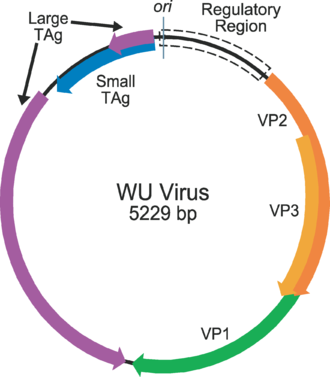Small tumor antigen




Small tumor antigen refers to a type of protein produced by viruses that are associated with cancer. These antigens are part of the early proteins expressed by viruses during the cellular infection process and play a crucial role in the transformation of a normal cell into a cancerous one. The study and understanding of small tumor antigens are significant in the field of oncology and virology, as they contribute to the development of vaccines and therapeutic strategies against virus-induced cancers.
Overview[edit]
Small tumor antigens are found in various oncoviruses, including the Human papillomavirus (HPV) and Merkel cell polyomavirus (MCPyV). These proteins have the ability to interfere with normal cellular functions, leading to uncontrolled cell growth and the eventual development of tumors. The mechanisms through which small tumor antigens exert their effects include the disruption of tumor suppressor genes like p53 and Retinoblastoma protein (pRb), which are crucial for cell cycle regulation and apoptosis.
Function[edit]
The primary function of small tumor antigens is to alter the host cell's environment to favor viral replication and persistence, a state that can lead to tumorigenesis. For example, HPV's E7 protein and MCPyV's LT antigen can bind to and inactivate the pRb protein, leading to the release of E2F transcription factors and the promotion of cell cycle progression. Similarly, interaction with p53 by some viral proteins can prevent cell cycle arrest and apoptosis, processes that are essential for the elimination of damaged cells.
Clinical Significance[edit]
Understanding the role of small tumor antigens in cancer development has been pivotal in creating preventive measures against certain types of cancers. For instance, vaccines developed against HPV, such as Gardasil and Cervarix, target the early proteins E6 and E7 to prevent the onset of cervical and other related cancers. Research into small tumor antigens also opens avenues for the development of targeted therapies that can specifically inhibit the functions of these viral proteins, offering a more personalized approach to cancer treatment.
Research and Future Directions[edit]
Ongoing research aims to uncover the full spectrum of mechanisms by which small tumor antigens contribute to cancer development. This includes studying their interactions with host cellular machinery, their role in the immune evasion of tumors, and their potential as biomarkers for early cancer detection. Furthermore, the exploration of small tumor antigen structure and function is crucial for the design of next-generation vaccines and therapeutics.
Ad. Transform your life with W8MD's Budget GLP-1 injections from $75


W8MD offers a medical weight loss program to lose weight in Philadelphia. Our physician-supervised medical weight loss provides:
- Weight loss injections in NYC (generic and brand names):
- Zepbound / Mounjaro, Wegovy / Ozempic, Saxenda
- Most insurances accepted or discounted self-pay rates. We will obtain insurance prior authorizations if needed.
- Generic GLP1 weight loss injections from $75 for the starting dose.
- Also offer prescription weight loss medications including Phentermine, Qsymia, Diethylpropion, Contrave etc.
NYC weight loss doctor appointmentsNYC weight loss doctor appointments
Start your NYC weight loss journey today at our NYC medical weight loss and Philadelphia medical weight loss clinics.
- Call 718-946-5500 to lose weight in NYC or for medical weight loss in Philadelphia 215-676-2334.
- Tags:NYC medical weight loss, Philadelphia lose weight Zepbound NYC, Budget GLP1 weight loss injections, Wegovy Philadelphia, Wegovy NYC, Philadelphia medical weight loss, Brookly weight loss and Wegovy NYC
|
WikiMD's Wellness Encyclopedia |
| Let Food Be Thy Medicine Medicine Thy Food - Hippocrates |
Medical Disclaimer: WikiMD is not a substitute for professional medical advice. The information on WikiMD is provided as an information resource only, may be incorrect, outdated or misleading, and is not to be used or relied on for any diagnostic or treatment purposes. Please consult your health care provider before making any healthcare decisions or for guidance about a specific medical condition. WikiMD expressly disclaims responsibility, and shall have no liability, for any damages, loss, injury, or liability whatsoever suffered as a result of your reliance on the information contained in this site. By visiting this site you agree to the foregoing terms and conditions, which may from time to time be changed or supplemented by WikiMD. If you do not agree to the foregoing terms and conditions, you should not enter or use this site. See full disclaimer.
Credits:Most images are courtesy of Wikimedia commons, and templates, categories Wikipedia, licensed under CC BY SA or similar.
Translate this page: - East Asian
中文,
日本,
한국어,
South Asian
हिन्दी,
தமிழ்,
తెలుగు,
Urdu,
ಕನ್ನಡ,
Southeast Asian
Indonesian,
Vietnamese,
Thai,
မြန်မာဘာသာ,
বাংলা
European
español,
Deutsch,
français,
Greek,
português do Brasil,
polski,
română,
русский,
Nederlands,
norsk,
svenska,
suomi,
Italian
Middle Eastern & African
عربى,
Turkish,
Persian,
Hebrew,
Afrikaans,
isiZulu,
Kiswahili,
Other
Bulgarian,
Hungarian,
Czech,
Swedish,
മലയാളം,
मराठी,
ਪੰਜਾਬੀ,
ગુજરાતી,
Portuguese,
Ukrainian
